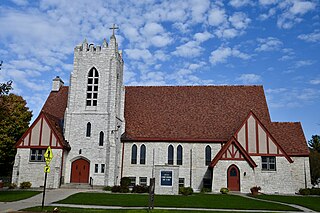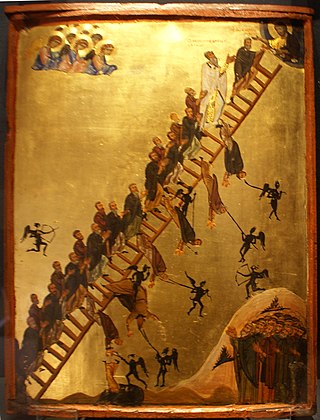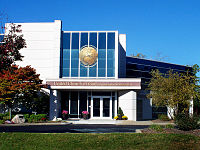To be born again, or to experience the new birth, is a phrase, particularly in evangelicalism, that refers to a "spiritual rebirth", or a regeneration of the human spirit. In contrast to one's physical birth, being "born again" is distinctly and separately caused by the operation of the Holy Spirit, and it occurs when one is baptized in water. It is a core doctrine of the denominations of the Anabaptist, Moravian, Methodist, Baptist, Plymouth Brethren and Pentecostal Churches along with all other evangelical Christian denominations. All of these Churches strongly believe Jesus's words in the Gospels: "You must be born again before you can see, or enter, the Kingdom of Heaven". Their doctrines also mandate that to be both "born again" and "saved", one must have a personal and intimate relationship with Jesus Christ.

Seventh Day Baptists are Baptists who observe the Sabbath as the seventh day of the week, Saturday, as a holy day to God. They believe in conscious baptism of believers by immersion, congregational government and the scriptural basis of opinion and practice. They profess a statement of faith instituted on fundamental precepts of belief. Seventh Day Baptists rest on Saturday as a sign of obedience in a covenant relationship with God and not as a condition of salvation. Many, have adopted a Baptist covenant theology, based on the concept of regenerated society.

Herbert W. Armstrong was an American evangelist who founded the Worldwide Church of God (WCG). An early pioneer of radio and television evangelism, Armstrong preached what he claimed was the comprehensive combination of doctrines in the entire Bible, in the light of the New Covenant scriptures, which he maintained to be the restored true Gospel. These doctrines and teachings have been referred to as Armstrongism by non-adherents.
Grace Communion International (GCI), formerly named the Radio Church of God and the Worldwide Church of God (WCG), is a Christian denomination based in Charlotte, North Carolina, USA.

The Church of God of Prophecy (COGOP) is a Holiness Pentecostal Christian Church. It is one of six Church of God bodies headquartered in Cleveland, Tennessee, that arose from a small meeting of believers who gathered at the Holiness Church at Camp Creek near the Tennessee/North Carolina border on Saturday, June 13, 1903.
The Church of Jesus Christ of Latter-day Saints has several unique teachings about Judaism and the House of Israel. The largest denomination in the Latter Day Saint movement, the LDS Church teaches the belief that the Jewish people are God's chosen people and it also teaches the belief that its members share a common and literal Israelite ancestry with the Jewish people.

The Churches of God (Seventh Day) is composed of a number of sabbath-keeping churches, among which the General Conference of the Church of God, or simply CoG7, is the best-known organization. The Churches of God (Seventh Day) observe the Sabbath on Saturday, the seventh day of the week.

Armstrongism is the teachings and doctrines of Herbert W. Armstrong while leader of the Worldwide Church of God (WCG). His teachings are professed by him and his followers to be the restored true Gospel of the Bible. Armstrong said they were revealed to him by God during his study of the Bible. The term Armstrongite is sometimes used to refer to those that follow Armstrong's teachings. Armstrongism and Armstrongite are generally considered derogatory by those to whom it is applied, who prefer to be known as members of the Church of God (COG). These doctrines were also espoused by his sons Richard David Armstrong and Garner Ted Armstrong with slight variations.
The Church of God, International (CGI) is a nontrinitarian Christian denomination based in the United States, an offshoot of the Worldwide Church of God (WCG) founded by Herbert W. Armstrong. It is one of many Sabbatarian Churches of God to separate from WCG.
The Paschal mystery is one of the central concepts of Catholic theology relating to the history of salvation. According to the Compendium of the Catechism of the Catholic Church, "The Paschal Mystery of Jesus, which comprises his passion, death, resurrection, and glorification, stands at the center of the Christian faith because God's saving plan was accomplished once for all by the redemptive death of himself as Jesus Christ." The Catechism states that in the liturgy of the Church "it is principally his own Paschal mystery that Christ signifies and makes present."
The investigative judgment, or pre-Advent Judgment, is a unique Seventh-day Adventist doctrine, which asserts that the divine judgment of professed Christians has been in progress since 1844. It is intimately related to the history of the Seventh-day Adventist Church and was described by one of the church's pioneers Ellen G. White as one of the pillars of Adventist belief. It is a major component of the broader Adventist understanding of the "heavenly sanctuary", and the two are sometimes spoken of interchangeably.
In Seventh-day Adventist theology, there will be an end time remnant of believers who are faithful to God. The remnant church is a visible, historical, organized body characterized by obedience to the commandments of God and the possession of a unique end-time gospel proclamation. Adventists have traditionally equated this "remnant church" with the Seventh-day Adventist denomination.

The Seventh-day Adventist Church holds a unique system of eschatological beliefs. Adventist eschatology, which is based on a historicist interpretation of prophecy, is characterised principally by the premillennial Second Coming of Christ. Traditionally, the church has taught that the Second Coming will be preceded by a global crisis with the Sabbath as a central issue. At Jesus' return, the righteous will be taken to heaven for one thousand years. After the millennium the unsaved cease to exist as they will be punished by annihilation while the saved will live on a recreated Earth for eternity.
The theology of the Seventh-day Adventist Church resembles that of Protestant Christianity, combining elements from Lutheran, Wesleyan-Arminian, and Anabaptist branches of Protestantism. Adventists believe in the infallibility of Scripture and teach that salvation comes from grace through faith in Jesus Christ. The 28 fundamental beliefs constitute the church's official doctrinal position.
The Seventh-day Adventist baptismal vow is a list of 13 belief statements which a person joining the Seventh-day Adventist Church is given and accepts at believer's baptism. In Adventist understanding, baptism, is associated with officially joining the Adventist church, which is a part of the community of believers in Christ. The vow is explained in the church manual. In 2005 an alternate vow consisting of three statements was approved at the General Conference Session, and the baptizing pastor now has a choice of which set to use. They complement the 28 Fundamentals.

Ahn Sahng-hong was a South Korean religious leader and founder of the Church of God. In 1948, after receiving baptism from a Seventh-day Adventist minister, he began to call for the restoration of the truth of the New Covenant and the last religious reformation. In 1964, he established the Church of God in Busan. During his lifetime, Ahn had 13 churches in Korea. After Ahn Sahng-hong's passing, the World Mission Society Church of God declared him as the Second Coming Christ.
The Samoan Assemblies of God International or SAOG is a Pentecostal fellowship of churches. It reached the Western Islands and outer countries with large Samoan communities, such as New Zealand, America and Australia. It has over 530 churches worldwide with over 97,000 adherents.

In Christianity, heaven is traditionally the location of the throne of God and the angels of God, and in most forms of Christianity it is the abode of the righteous dead in the afterlife. In some Christian denominations it is understood as a temporary stage before the resurrection of the dead and the saints' return to the New Earth.
The Pillars of Adventism are landmark doctrines for Seventh-day Adventists. They are Bible doctrines that define who they are as a people of faith; doctrines that are "non-negotiables" in Adventist theology. The Seventh-day Adventist church teaches that these Pillars are needed to prepare the world for the second coming of Jesus Christ, and sees them as a central part of its own mission. Adventists teach that the Seventh-day Adventist Church doctrines were both a continuation of the reformation started in the 16th century and a movement of the end time rising from the Millerites, bringing God's final messages and warnings to the world.







